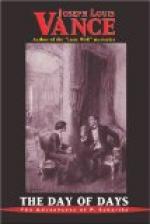A machine; a fixture; creature of an implacable routine; a spirit immolated upon the altar of habit: into this he had degenerated in ten years. Such was the effect of life in this melancholy shelter for the homeless wage-slave. He was no lonely victim. In his term he had seen many another come in hope, linger in disappointment, leave only to go to a meaner cell in the same stratum of misfortune.
Was this radiant spirit of youth and gentle loveliness (who might, for all one knew to the contrary, be Marian Blessington after all) to be suffered to become one of that disconsolate crew?
What could be done to prevent it?
Nothing that the wits of P. Sybarite could compass: he was as inefficient as any gnat in any web....
Through the halls resounded the cacophonous clangour of a cracked gong announcing dinner. Sighing, P. Sybarite rose and knocked the ashes delicately from his pipe—saving the dottle for a good-night whiff after the theatre.
Being Saturday, it was the night of ham-and-beans. P. Sybarite loathed ham-and-beans with a deathly loathing. Nevertheless he ate his dole of ham-and-beans. He sat on the landlady’s right, and was reluctant to hurt her feelings or incur her displeasure. Besides, he was hungry: between the home-exerciser and the daily walks to and from the Brooklyn Bridge, his normal appetite was that of an athlete in pink of training.
Miss Lessing sat on the same side of the main dining-table, but half a dozen chairs away. P. Sybarite couldn’t see her save by craning his neck. He refused to crane his neck: it might seem ostentatious.
Violet and her George occupied adjoining chairs at another and smaller table. Their attendance was occasionally manifested through the medium of giggles and guffaws. P. Sybarite envied them: he had it in his heart to envy anybody young enough to be able to see a joke at that dinner table.
By custom, the landlady relinquished her seat some minutes in advance of any guest. When P. Sybarite left the room he found her established at a desk in the basement hallway. Pausing, he delivered unto her the major portion of his week’s wage. Setting aside another certain amount against the cost of laundry work, tobacco, and incidentals, he had five dollars left....
He wondered if he dared risk the extravagance of a modest supper after the theatre; and knew he dared not—knew it in wretchedness of spirit, cursing his fate....
There remained half an hour to be killed before time to start for the theatre. George Bross joined him on the stoop. They smoked pensively, while the afterglow faded from the western sky and veil after veil of shadow crept stealthily out of the east, masking the rectangular, utilitarian ugliness of the street, deepening its dusk to darkness. Street lamps, touched by the flame-tipped wand of a belated lamplighter, bourgeoned spasmodically like garish flowers of the




